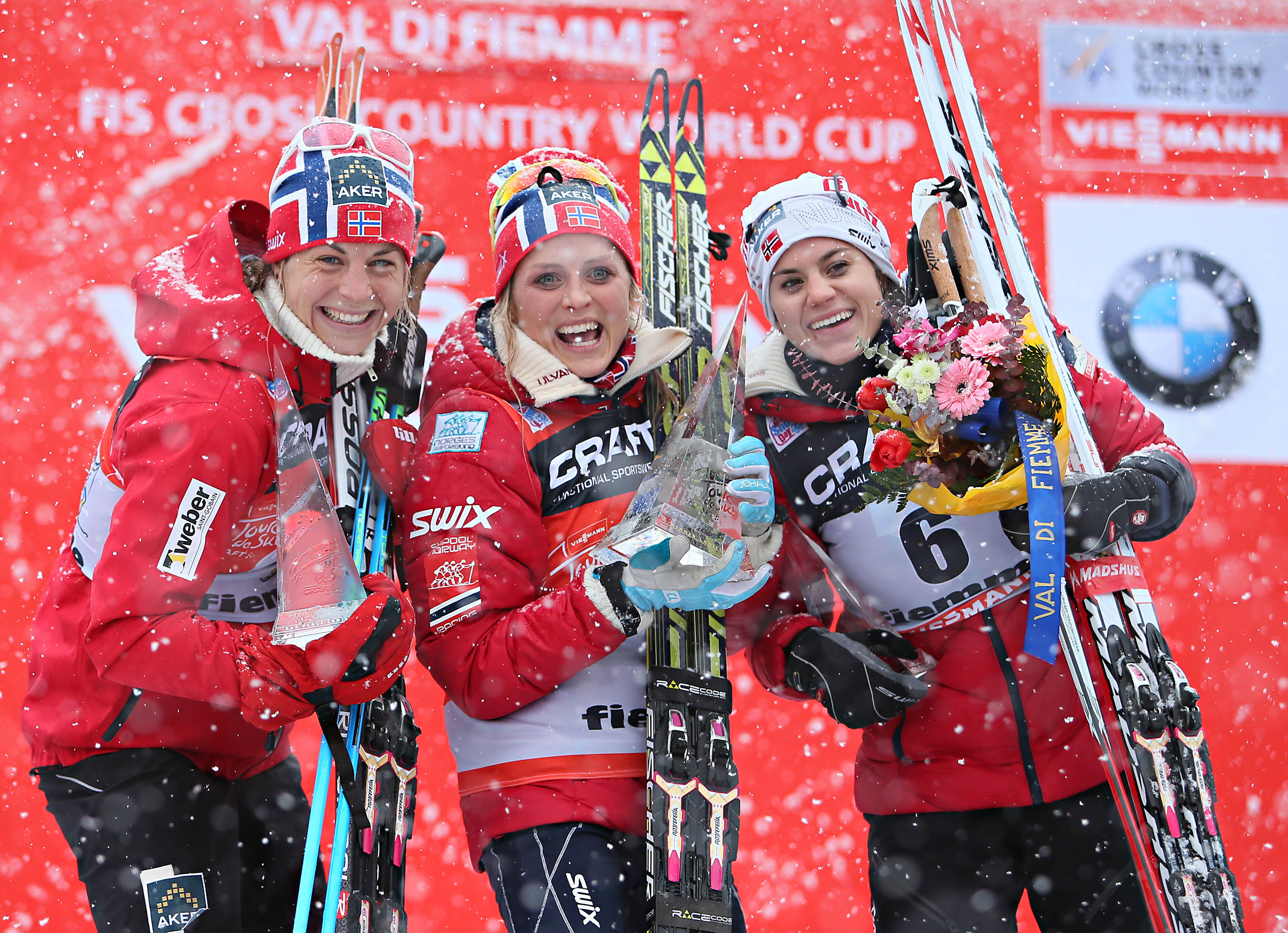
Norway has suffered few droughts in the history of competitive cross-country ski racing, with periods of total dominance interrupted by slumps that would be the envy of most other nations.
But over the course of the last decade, there has been one event where victory has eluded the sea of red that has ruled the major championships and regular season alike.
No Norwegian had won the Tour de Ski, the grueling stage race modeled on the multi-day event popular in elite cycling, though there were plenty of close calls.
In the seven years the event had run, Norway totaled 11 podium finishes and five sprint cup victories. Petter Northug finished second three times and Marit Bjørgen and Therese Johaug two each.
That all changed on a sopping day on the Alpe Cermis, site of the renowned Final Climb. The Norwegian women, led by climber extraordinaire Johaug, swept the podium in definitive fashion.
As expected Johaug overtook teammate Astrid Jacobsen on the three kilometer ascent, and skied away to a clear victory. Jacobsen maintained her lead on the rest of the field to take second, while 22-year-old Heidi Weng held off an impressive comeback by Finland’s Krista Lahteenmaki to round out the podium.
Johaug became just the fourth woman to win the Tour in eight years, joining four-time defending champion Justyna Kowalczyk of Poland, two-time winner Virpi Kuitunen (FIN) and Sweden’s Charlotte Kalla.
Jacobsen, a somewhat surprising force on the Tour this year, had planned to withdraw after four stages, but with a chance to win, and a podium spot firmly in grasp, she kept racing.
She entered the final stage with a 23.8 second lead on Johaug, substantial, but in her mind, not enough. In the days leading up to the Final Climb she consistently pointed to Johaug as the favorite, a claim not based in false modesty.
Entering this season, Johaug completed the Tour five times. Her first season in the event, 2008, she was fourth in the last stage before reeling off four consecutive Final Climb victories, often by a large margin.
Jacobsen, a tall powerful skier, excels on more gradual terrain, and she left the start in a hurry, pushing through the earlier flats and descents. Johaug, however, kept pace, and while Jaccobsen did not falter on the hill, she was no match for the high tempo and light step of Johaug.
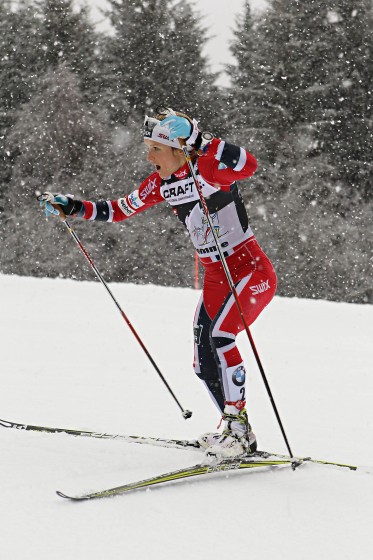
Johaug came up from behind, and did not hesitate, moving right by her teammate, and immediately opening a gap on the 28 degree headwall half way up. With Jacobsen single-sticking and Johaug in a V1, the lead grew.
Jacobsen said after the race that she was focused on her own race.
“I knew Therese is a strong climber,” she told FIS News. “I skied my own speed. Therese passed me fast.”
As the terrain became more skiable again, Jacobsen slowed the bleeding, but the damage was done. Johaug, not taking anything for granted, looked back several times, confirming her lead was secure.
She crossed the line with a pump of her arms and a yell, before collapsing into the new wet snow. Jacobsen followed 20 seconds later, falling into her own gasping heap.
The pair had some time to recover before the rest of the field trudged into sight. Anne Kylloenen (FIN) started in third, +1:31.5, and lost ground from the start.
Weng, in bib 6, quickly formed up with two more Finns, Lahteenmaki and Kerttu Niskanen, and set about hunting Kylloenen, the trio staying together into the climb.
Niskanen was the first to drop, unable to manage the pace. Weng, doing most of the leading, pulled Lahteenmaki by Kylloenen, with the later looking exhausted.
Racing in her second Tour, Weng appeared the more controlled, and when she pulled away from Lahteenmaki on the big switchbacks, it appeared the podium would be solid red.
But the steep grade makes distance meaningless. Eight hundred meters straight uphill takes a long time, and with the focus on the top two, Lahteenmaki made one last charge, closing back up on Weng, catching her with just 65 meters to go. Sprint finishes are usual in the Tour, particularly for the podium, and they are always agonizing, the athletes trying to eke one last push out of exploding muscles and lungs.
At the 50 meter mark, Lahteenmaki pulled alongside Weng, trying to gain the advantage, but the Norwegian had something in reserve, accelerating, and leaving Lahteenmaki meters back in fourth.
Johaug and Jacobsen waited across the line cheering voraciously. As Weng collapsed in the snow, the top two fell on top of her, celebrating over their nearly comatose teammate, finally rising and high-fiving.
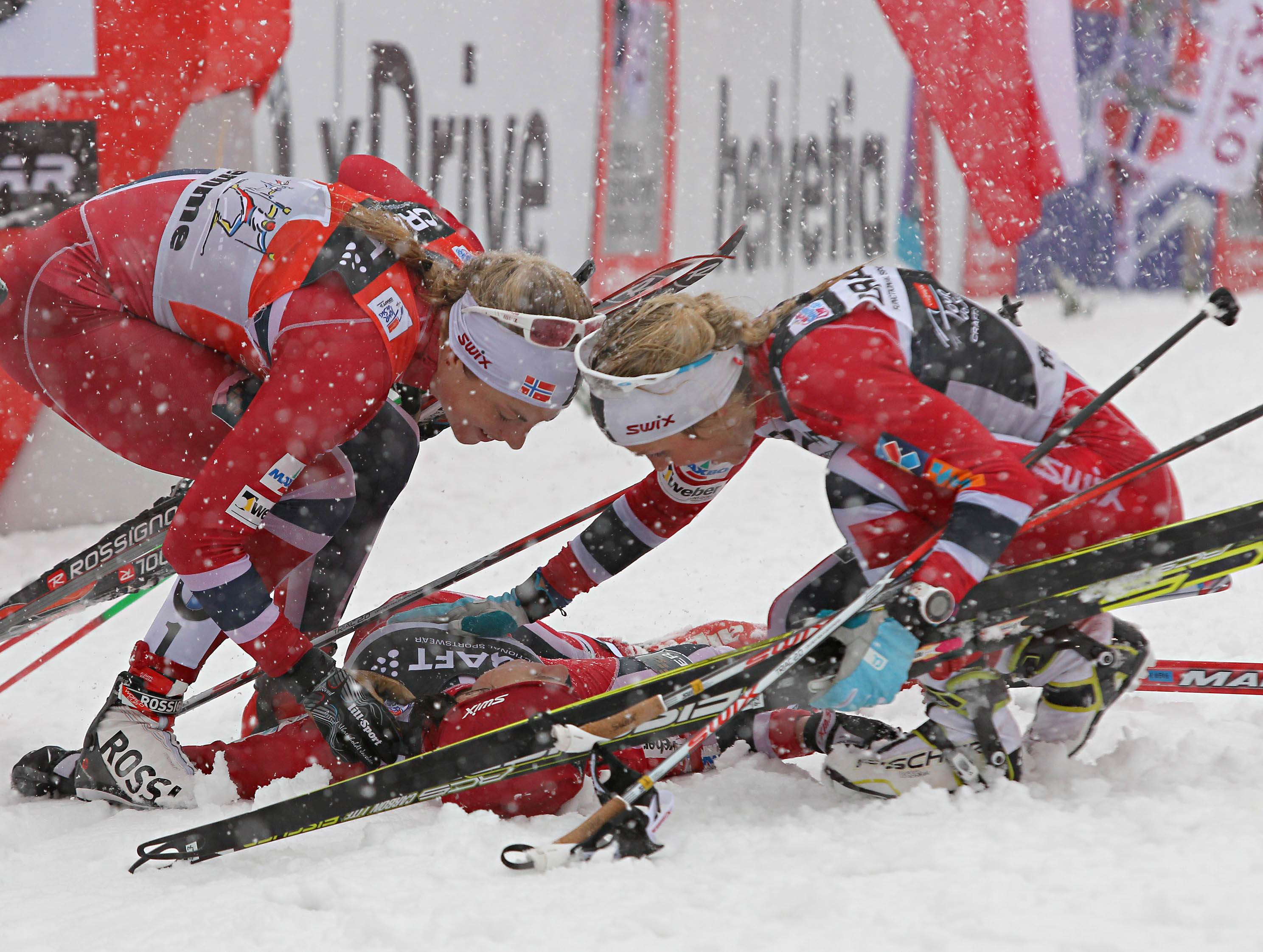
The trio were the only Norwegians to finish the whole event, with star Marit Bjørgen dropping out due to illness, and last year’s bronze medalist, Kristin Stoermer Steira also withdrawing, with bronchial issues.
Niskanen followed Lahteenmaki in fifth, and Kylloenen was sixth before American Liz Stephen broke up the Norwegian/Finnish parade.
Johaug posted the fastest time of the day, 44.2 seconds ahead of Jacobsen. Stephen was third best, another 14.5 back, followed by Weng.
“It’s a dream come true for me,” Johaug told FIS News after the race. “It is amazing to become the first Norwegian to win the Tour, and even better when Astrid and Heidi could join me on the podium.”
Heavy rain turning to wet snow made for soft, slow conditions, and perhaps the toughest Final Climb ever. Norwegian coach Egil Kriastensen describes the snow as “like glue” to Norwegian broadcaster NRK.
“There are many thoughts through your head when you pass the finish line,” Johaug told NRK. You are quite tired, and many of the thoughts turn to how much I have sacrificed…Now it’s absolutely worth it.”
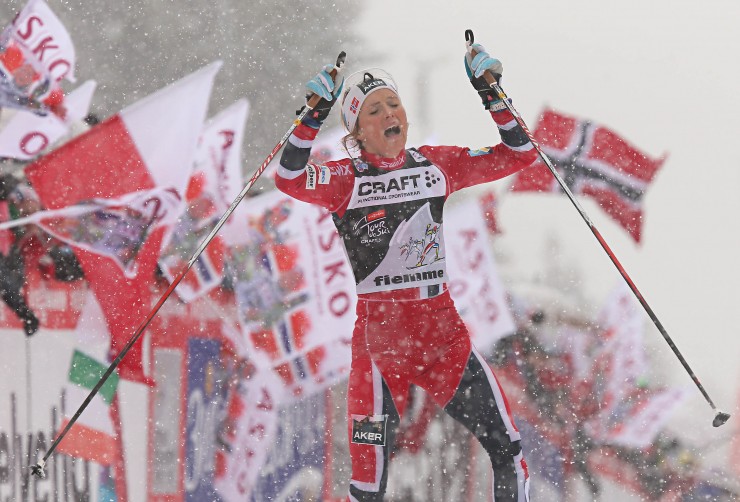
Jacobsen was also thrilled with her performance.
“I have good reason to be proud. I’m number two behind Therese. Who’d have thought it?” she said to NRK.
Jacobsen won the World Championship sprint in 2007 in Sapporo, Japan, but while she has turned in plenty of strong results, her career has been interrupted by a combination of illness and serious injury.
The young Weng has plenty to look forward to, and is ready to head home to start recovery.
She described the experience as “almost like World Championships” last year in Val di Fiemme, where she took bronze in the skiathlon and was a member of the gold medal winning relay team.
“Now I will go home and eat everything I come across,” Weng told NRK.
Of Note:
– Maako Ishida (JPN), usually a force in classic, was fifth fastest on the day
– Eva Vrabcova-Nyvltova (CZE) was a surprising eighth overall. The 27-year-old has never stood on a World Cup podium and has just six top-10 results in her career, two of which came in this Tour.
– Twenty-year-old Julia Svan, daughter of the great Swedish skier Gunde Svan, placed 41st out of 42 skiers.
– Overall 38 skiers withdrew from the Tour, including Kowalczyk and Anastasia Slonova (KAZ) both of whom did not start the first stage.
– Kowalczyk did not start in protest of the format, particularly the number of skate events.
– Valentina Schevchenko (UKR) completed her eighth Tour at age 38. She is the only person to ski every Tour de Ski. She finished 14th. Schevchenko was third in the inaugural Tour back in 2007.
– Jacobsen won the Sprint Cup for best Tour sprinter. The ranking combines the sprint races with additional sprint bonuses from distance races. She was the first Norwegian woman to win the Cup. Ingvild Flugstad Oestberg was second and Johaug third.
– Johaug helped herself with continued improved sprinting. She set a career-best Tour sprint mark by placing 7th in Oberhof, Germany and was 24th in Lenzerheide, Switzerland, picking up valuable bonus seconds.
Time of Day (PDF)
Topher Sabot
Topher Sabot is the editor of FasterSkier.

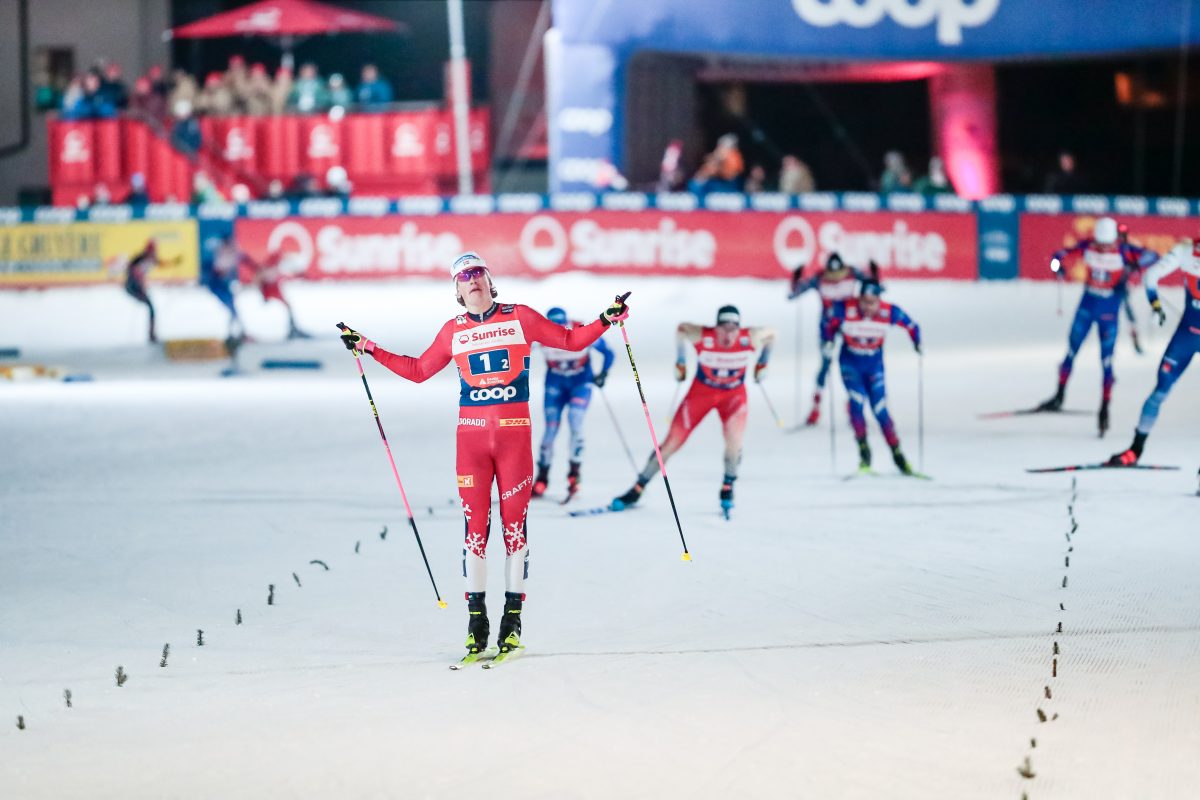


7 comments
skinnyskisfattires
January 6, 2014 at 3:06 am
GO LIZ! I gotta say, FS…..it took you 800 words to get around to Liz Stephen. I think the fact that Liz posted the THIRD fastest time of the day and ended up SEVENTH overall deserves much earlier mention and much more attention than some Norwegian drought at the hands of Kowalczyk.
shreddir
January 6, 2014 at 9:07 am
If you paid attention to how the site works skinnyskisfattires you would know FS always follows up later with a much more detailed article about our girls. The first headliner article always has to be about the podium winners first.
FasterSkier
January 6, 2014 at 9:41 am
Thanks shreddir – that is exactly what happens. It is often difficult to get in touch with athletes due to travel, poor internet, and recovery needs, and thus detailed articles on US and Canadian skiers will be delayed. We are currently working on three more articles from yesterday’s races – Noah Hoffman, Ivan Babikov, and Liz Stephen/Jessie Diggins.
skinnyskisfattires
January 6, 2014 at 12:15 pm
Thanks shreddir – rebuke noted and apologies to Toher if I’m out of line. On the other hand, I do pay attention, maybe more than healthy, but just enough to note that as “our girls” close in on the podium more often (Liz was third on the day), “how the site works” and what “has to be” risks artificially separating North American results from international results.
skinnyskisfattires
January 6, 2014 at 12:15 pm
That would be “Topher”…
FasterSkier
January 6, 2014 at 9:35 pm
We make a conscious decision to focus our “International Reports” on the podium finishers, and the race for those spots. We believe covering the overall race and who wins, is both important and desired by our readers. We then cover the NOrth American skiers separately, unless they happen to be in the race for the podium.
There are certainly other ways to approach coverage, but we find this method provides the widest breadth of coverage, as well as detail on North American performances. I certainly understand if you disagree.
Thanks for your thoughts!
Strider2
January 7, 2014 at 12:36 am
re: skinnyskierfattires
“some Norwegian drought at the hands of Kowalczyk.” Jeez what’s with the negativity on here. Heidi Weng is only 22, it’s a tremendous accomplishment for her to get a podium in the TDS at such a young age. Also, I doubt Kowalczyk would have made Top 5 this year even if she had entered due to her declining performance in skate skiing. I’m also very excited about Elizabeth Steven’s performance, but I think it’s unfair of you to dismiss the Norwegians’ achievement as a result of Kowalcyzk not showing.